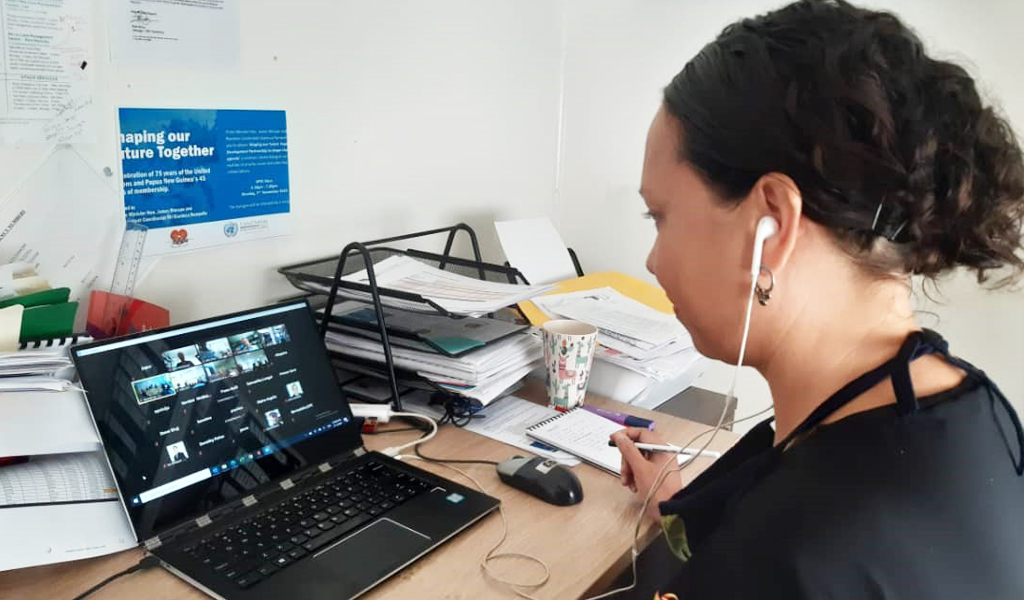
Evonne Kennedy, Executive Director of the Business Coalition For Women, launches the Family and Sexual Violence Workplace Survey at Steamships Trading Company Limited over Zoom in November. The launch was attended by approximately 300 Steamships employees from across Papua New Guinea.
As the COVID-19 pandemic increases the incidence of gender-based violence around the globe, new research now underway in Papua New Guinea will for the first time examine and measure the costs and benefits of workplace responses to the problem.
The groundbreaking research project, launched this month
by IFC and the Business Coalition for Women (BCFW) in Papua New Guinea (PNG), comes
amid a jump in gender-based violence globally, underscored by a
rise in calls to helplines, health centers and police. At the same time, initiatives to prevent violence and protect people have been cut back while responses to counter the spread of the virus have made it more difficult for those in need to access help.
The problem has only been exacerbated by widespread lockdowns ordered to combat outbreaks of COVID-19. In many cases, women and children have been locked down in places with perpetrators of violence.
“There are many types of gender-based violence that impact the workplace, such as client aggression, workplace bullying and sexual harassment and violence experienced by employees at work, home and in their communities,” said BCFW Executive Director Evonne Kennedy. “Seeking help may also be more difficult amid the COVID-19 pandemic. When many companies are downsizing, employees may not raise issues of violence as they may fear an increased risk of retaliation, including being fired,” she said.
In PNG, a nation where more than two thirds of women experience violence, there was a drop of more than 30 percent in the number of those accessing gender-based violence services during the period when a COVID-19-related state of emergency was in place, according to the United Nations Population Fund. Survivors struggled to access vital services with limited transport, increased caregiving and domestic responsibilities and a lack of information on COVID-19 contributing to the difficulties associated with getting help.
While gender-based violence has devastating impacts on the lives of people, it also has direct consequences for businesses, affecting employee safety, attendance, and productivity, and damaging companies’ financial performance, reputation and overall resilience. IFC research in Fiji undertaken prior to the pandemic showed high rates of domestic and sexual violence there led to lost staff time and reduced productivity equivalent to almost 10 days of work per employee each year.
The IFC and BCFW research project underway in PNG will for the first time apply an analysis that aims to not only build an evidence base for the costs to business associated with family and sexual violence, and also the benefits of providing coordinated and comprehensive responses for affected employees.
It also aims to motivate the private sector in responding to family and sexual violence in workplaces and encourage more businesses in PNG to bring in workplace support for affected staff, including by subscribing to Bel isi PNG, an organization helping those who experience family and sexual violence.
The two-year project, supported by the governments of Australian and New Zealand under the PNG Partnership, in collaboration with Femili PNG and the Oil Search Foundation, will also leverage the unique relationship between BCFW, its business members and Bel isi PNG. Under the PNG Partnership, IFC works with the support of Australia and New Zealand to stimulate private sector investment and reduce poverty in PNG.
The project will analyze data from major PNG companies including Bank South Pacific Limited, Nambawan Super Limited and Steamships Trading Company Limited, and from Bel isi PNG. Research will focus on the costs and benefits of employers providing support to employees experiencing family and sexual violence, including access to Bel isi PNG’s services, which include a safe house providing refuge for at-risk women and children and the only case management center in PNG’s capital Port Moresby.
“The companies we work with are leading the way in acknowledging that addressing all forms of violence that affect the workplace is vital to ensuring employees and businesses can operate in a safe and resilient environment,” said Thomas J. Jacobs, IFC Country Manager for Australia, New Zealand, Papua New Guinea and the Pacific Islands.
IFC will work with Business Coalition For Women staff so they can deliver these research and analysis services going forward. The research comes as IFC continues to advise firms around the world on approaches to addressing gender-based violence, including through this guidance note to
firms specific to the COVID 19 pandemic.
In the Pacific, businesses working with IFC have reported that employees who are offered supports like training on domestic and sexual violence and work feel safer at work and behave more respectfully towards each other. In PNG, BCFW has developed widely adopted culturally appropriate family and sexual violence resources for the corporate sector, helping support those impacted, and mitigate the negative business impacts.